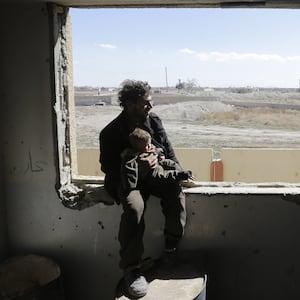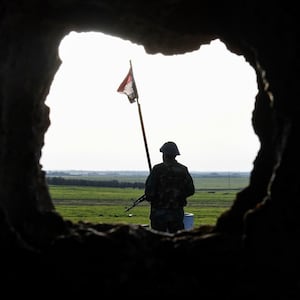THE HAGUE, Netherlands—Turkey is about to invade the part of Syria the U.S. invaded to defeat the so-called Islamic State. Except Turkey is invading it to defeat the Kurdish proxy force the U.S. relied on to defeat ISIS, because Turkey considers that proxy a terrorist group. And U.S. President Donald J. Trump, apparently, is fine with that.
This according to a White House announcement released late Sunday evening that reads as if it were written by someone who wants absolutely nothing to do with a part of a world as fucked up as the Middle East and doesn’t care if the whole place burns to the ground.
The move came after Trump, in yet another decisive phone call that probably will be locked away, spoke with Turkish President Recep Tayyip Erdogan. Trump’s decision was to have the United States accede to a NATO ally’s invasion of a de facto U.S. protectorate—an invasion that has been long in the making and is expressly designed to gobble up a crucial U.S. ally.
This sounds crazy and it is. But before you turn on your cable news show to find all manner of pundits filtering this Alice-in-Wonderland development through the narrow prism of a domestic news cycle, let me assure you of the following. It has nothing to do with Trump’s manifold domestic crises or the fact that his Twitter feed now resembles that of a homeless man barking at oncoming traffic. What is happening now derives from the inherent contradictions built right into America’s war on terror that are coming to the fore and threatening to precipitate the very thing that the fight against ISIS was meant to reduce.
Since 2014, the Pentagon has disproportionately relied upon one faction of armed Kurdish guerrillas who, in a sticky little turn of fate, have been fighting the Turkish state for over 40 years. Ankara has been none too pleased that America’s preferred battering ram against jihadism has a long history of blowing up Turkish army bases and police stations, albeit on secular Marxisant grounds rather than apocalyptic religious ones.
Before the rise of ISIS, the U.S. even agreed with Turkey’s assessment of the Kurdistan Workers’ Party, or PKK as it is known by its acronym, which is why this organization is still a designated terrorist entity in Washington. Well, needs must. When Mosul fell to the black-clad head-loppers, the U.S. cast about looking for a viable proxy force to beat them back in their headquarters and outlying areas in Syria.
At first the U.S. tried repurposing various elements of the Free Syrian Army for this task, but that program proved an embarrassing farce, mainly because the (mostly Arab) Syrian insurgents wanted to overthrow the genocidal Assad regime in Damascus, not act as Delta Force’s Foreign Legion east of the Euphrates River. The Pentagon soon found the most capable and reliable proxy going was the YPG, the Syrian affiliate of the PKK, which was under existential threat from ISIS’ onslaught and shrewdly realized that having the world’s only superpower behind you is a good way of pursuing your political ends through fire and steel.
Under the canopy of F-18s, the YPG has stretched across a vast swath of northeast Syria, acting as the Kurdish janissaries of America’s anti-ISIS mission. The Kurds of what is known as “Rojava,” or Syrian Kurdistan, thus engaged in their own nation-building exercise on the ruins of ISIS’ and as a direct function of America’s counterterrorism campaign.
This has rattled Turkey to no end, which is why it has previously mounted incursions into other parts of northern Syria, west of the Euphrates, such as Afrin, to expel the YPG and establish its own buffer zone along the Syrian-Turkish border.
“It’s as if we sent al Qaeda into Mexico to fight the cartels,” is how one now-former Turkish security official once put it to me. “How would the U.S. like that on its doorstep?”
The U.S., meanwhile, has recognized Turkish security concerns and tried to appease them by offering sops such as joint patrol mechanisms, “safe zones,” and fecklessly insisting that the new Syrian Democratic Forces—the umbrella under which the YPG now operates—is increasingly controlled by local Arab fighters, not just Kurds. To no avail.
And what really makes this the Mad Hatter’s Tea Party of Levantine developments is the fact that Erdogan has enlisted some of the very same Free Syrian Army factions once backed by the CIA and Pentagon to join his new proxy army, the one hours away from marching into Syrian Kurdistan and going to war with the U.S.-backed YPG.
The immediate effects of this confrontation, which the U.S. says it won’t stop or in any way be a party to, aren’t hard to divine.
The first thing that will happen is that YPG forces south of the invasion line will abandon their posts to join their comrades up north, unspooling some of the much-needed security blanket which has enveloped Raqqa and Deir Ezzor to forestall the return of ISIS.
The second thing that will happen is the Kurds, absent air support, will be beaten and Turkey will ethnically cleanse the territories it takes from the YPG.
And that brings me to the third thing that will happen, which, even if you can’t tell a hawk from a handsaw in this forbidding war zone, should have you worried.
For years, ISIS has watched as America’s reliance on the YPG/PKK has enervated the second-largest army in NATO. It has cleverly preyed upon this tension by waging terror attacks in Turkey it declined to claim credit for, knowing full well that Erdogan and his government might blame them on the PKK, which it did on more than one occasion.
Turkey, meanwhile, had maintained a see-no-evil policy (or worse) with respect to ISIS as its sovereign territory became a staging ground for exported jihad, not to mention a fallback base of operations for the many agents of ISIS’s Amniyat, or intelligence service, who were dispatched out of Syria and into Western Europe.
In other words, ISIS leader Abu Bakr al-Baghdadi (yes, he’s still alive) exploited the Kurdish Question before and will exploit again now that all-out war between Turkey and Syria’s Kurds is a foregone conclusion.
And so long as the inevitable carnage stays in the neighborhood, we can be reasonably sure that Donald Trump won’t care or will treat this as just the latest manifestation of a regional pathology, and not an unforced error of lousy U.S. policy-planning.
The Middle East—at least the parts of it he isn’t building golf courses and hotels in—Trump considers a place of sand, death, and oil that America isn’t stealing but should. He ran on a campaign platform of wanting to “bomb the shit” out of ISIS and call it a day and he thought himself bold and ingenious for advocating what was, in its broad and characteristically inarticulate contours, the very sort of counterterrorism-only, get-in-get-out U.S. strategy that had in fact been on the books for quite a while already.
Indeed, it was a strategy that, in Iraq, allowed ISIS in its earlier incarnation to go from being a battered and scattered insurgency to a full-blown “caliphate” in a matter of three years. And it was a strategy first pursued by the man Donald Trump loathes with a rare passion, Barack Obama, although neither probably appreciates the irony that Syria is about to go tilt-a-whirl again because they ended up agreeing more than disagreeing with each other.








